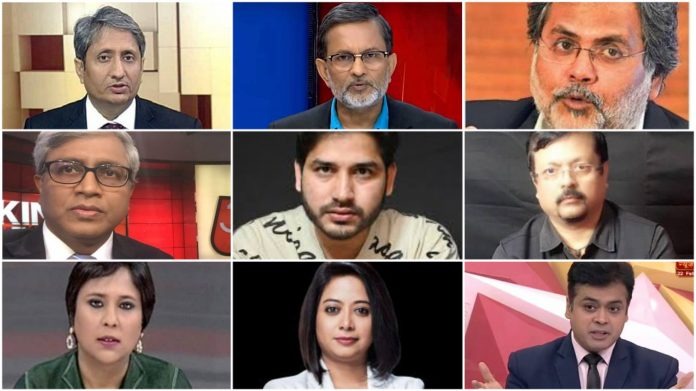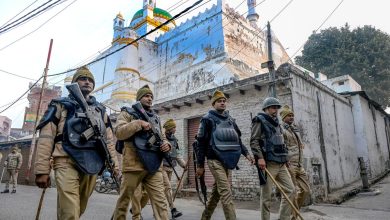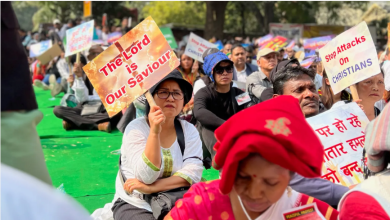Mounting pressure, threats force Indian journalists to move to social media
 New Delhi: In view of escalating pressure, coercive strategy aimed at suppressing dissenting media voices, many renowned Indian journalists have moved to YouTube since Narendra Modi government came into power in the country in the quest for truth.
New Delhi: In view of escalating pressure, coercive strategy aimed at suppressing dissenting media voices, many renowned Indian journalists have moved to YouTube since Narendra Modi government came into power in the country in the quest for truth.
According to Kashmir Media Service, a report by a freelance content writer Ziyauallah Khan and carried by Nagpur based Muslim Mirror writes that Indian journalists find solace in the digital realm in today’s India, which is ranked 161st out of 180 on the World Press Freedom Index.
The resonating voice of Ravish Kumar, an emblematic figure in Indian journalism, echoed on November 30, 2022, as he announced his departure from NDTV after 27 years. This pivotal moment marked a confluence of personal tribulations and the impending spectre of a hostile takeover of NDTV by an oligarch with close ties to Prime Minister Narendra Modi.
Kumar’s decision symbolised a crucial juncture for Indian journalism, prompting a closer examination of the challenges faced by media practitioners in the country.
For Kumar, the decision to part ways with NDTV was driven by a commitment to preserving journalistic integrity. Apprehensive about NDTV succumbing to what he coined as “Godi media,” an alignment with the government’s narrative, Kumar opted for departure amid a backdrop of personal and professional challenges. Driven by an unwavering commitment to journalistic integrity, Ravish Kumar chose to sever ties with NDTV, haunted by the spectre of the network aligning with what he termed “Godi media”—a subservience to the government’s narrative.
The Modi administration’s reprisal against NDTV materialised through accusations of money laundering, instigating a boycott, sponsorships loss, and mass layoffs. This coercive strategy aimed at suppressing dissenting media voices, fostering an environment that imperilled the core tenets of unbiased journalism. This orchestrated assault posed a severe threat to NDTV’s independence, exemplifying the broader challenges faced by media entities resisting aligning with prevailing political narratives in India.
Opting for YouTube as his platform, Ravish Kumar gracefully announced his resignation, expressing gratitude to his audience. The emotional resonance of his announcement, viewed by 9.6 million people, underscored public concerns about the integrity and future of journalism in India.
Kumar’s departure symbolises a shifting landscape where prominent journalists seek refuge on social media platforms, reflecting the public’s desire for unbiased news in the face of mounting challenges to journalistic independence.
Journalists’ Migration to Social Media Kumar’s exit mirrors a larger trend where distinguished journalists abandon traditional media, finding sanctuary on YouTube and other social platforms. This migration responds to escalating government pressure and the myriad challenges confronting traditional media, positioning social platforms as the final frontier for disseminating unbiased news. As these respected voices navigate away from mainstream outlets, social media emerges as the sole refuge to uphold journalistic integrity and provide unfiltered narratives, reinforcing its critical role in preserving the essence of free and unbiased journalism in the face of unprecedented challenges.
Venturing into independent endeavours on platforms such as YouTube and Instagram is also not an easy task in the present-day India under Modi. Journalists are exposed to increased vulnerabilities including financial insecurity, minimal legal support, and the looming spectre of physical threats. These solitary voices grapple with the persistent threat of online harassment, warnings, isolation, potential equipment seizures, home raids, and the daunting prospect of imprisonment.
The NDTV takeover, a pivotal media institution, symbolized the precarious state of journalism in India. This event became emblematic of the challenges faced by media outlets resisting alignment with prevailing political narratives.
Journalists like Akash Banerjee, foreseeing potential government interference, emphasize the critical importance of legal preparedness as a shield against adversities. The incident not only underscored the vulnerability of media independence but also highlighted the pressing need for journalists to fortify themselves legally in the face of increasing threats to journalistic autonomy in the Indian media landscape.
Ranked 161st out of 180 on the World Press Freedom Index, Indian journalists grapple with an environment that challenges their freedom and safety. The shift to YouTube and social media emerges as a desperate yet necessary response to navigate the escalating government control over mainstream media.








